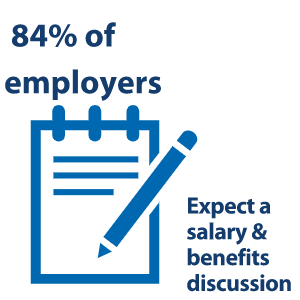How to negotiate your salary
Congratulations on the new job. After prepping your CV (Curriculum Vitae), researching the employer, and several rounds of interviews you have an exciting new role. But is the initial salary offer all you expected? To secure the right candidate, employers are offering higher salaries, increased benefits, and in some cases, sign-on rewards.
Yet some employees do not negotiate their salary and accept the first offer put to them. If a candidate is happy with the offer, that is fantastic, their wage matches their expectations and both parties are happy.
However, only 30% of people are happy with their salary, meaning 70% of talent can be enticed to leave their jobs if a better offer comes in.
Remember, the several rounds of interviews, the project, and selection process it took to get the job offer? This process is also time-consuming for hiring managers. They put in valuable time working through the candidate approval process. And with candidates pursuing multiply roles at a time, this effort can be wasted if the salary offer does not meet the candidate's expectations.
Or if an offer is accepted, the employee can leave in short order if a better offer comes along. Which, in the current climate, is a distinct possibility.
If a prospective employer makes a job offer, it is because the candidate is the right fit for the role. Even though employers can be just as eager as the applicant to seal the deal, many organisations lowball candidates. In the current climate, job seekers need to negotiate, not only their salary but their benefits and working conditions too.
Salary negotiations
84% of hiring managers expect a salary and benefits discussion, this conversation is a part of the hiring process. Also, negotiating may positively impact an employer's impression of a candidate, who is demonstrating skills that may be useful in their role and showing confidence in their abilities and value.
While salary should not be the only reason to apply for a specific role, it is a major component to consider. It is beneficial for candidates to be clear and honest about their compensation expectations throughout the whole recruitment journey. This helps avoid any surprises when it comes to the salary negotiation stage.
Know your market value
Before the interview process even begins, a candidate needs to evaluate their market value. This is their overall suitability for the role. Market value can be looked at in relation to the job title in general. However, it makes more sense to be more granular and determine market value in relation to each specific role. There are several factors that contribute to a person's market value, here are the main ones.

A. What is the average salary range for the position?
Research benchmarked salaries for the job title to get an idea of the salary range. You can find extensive salary ranges in the Cpl Salary Guide for Ireland.
B. Location
Salary ranges differ in different locations. Expectations can be higher in job markets with a higher demand for a particular skill set. The cost of living is another, location-related factor that can affect salary ranges.
C. Organisation size
Larger organisations have more resources and procedures in place to offer a potential employee more compensation compared to an SME. A candidate needs to consider the size of the organisation they are interviewing with as it could affect the package they are offered and their future career opportunities.
D. Work experience and qualifications
Obviously, someone with 5 years’ experience in a related role will command a higher salary than a recent graduate. But experience beyond what is needed for the role will not push up the salary. In fact, being overqualified is a reason not to offer someone a role they may quickly bore of.
Many industries, like Engineering or Law, require sector-specific degrees and the quality of the degree, where the applicant studied, will also have an impact on their desirability.
E. Job title research
What are other organisations offering for same job title? Browsing job search websites and taking note of what is out there can help evaluate if the set salary is above or below average. If there is not a set salary on the job description a candidate should use their research of similar roles to help benchmark a starting salary rate.
To evaluate market value, job seekers need to examine their qualifications, experience, organisation size and do their research on salary ranges in the location for similar job titles. If there is a set salary noted on a job description and an applicant meets all the qualifications, they should negotiate for the upper end of the range.
Perks and Benefits
While salaries are increasing in some industries, employees are now looking for more than just a decent wage.
Over the past few years, employees' needs have changed. And salary negotiations are not just about remuneration anymore. The transition to hybrid and remote working has sparked a fire in workers. Factors like work-life balance, flexible working, and extended annual leave have become just as crucial as salary.
Learning and Development
Employee learning and development (L&D) options are becoming increasingly important. A good L&D program can make a significant impact on an employee's ability to achieve their career goals. In a survey recently conducted, 66% of workers (aged 18-24) regarded learning and development opportunities as the third most important remuneration when looking for employment.
Although there is a strong demand for businesses to provide learning and development, it is critical that candidates set their own professional goals before even interviewing.
Applicants should lay out their professional aspirations and inquire whether the organisation can provide upskilling in these areas throughout the negotiation phase.” 30% of UK (United Kingdom) workers say they have not received formal workplace training in the last five years” and with only 26% of training budgets going on external courses, employees looking to develop specific skills sets need to understand what L&D opportunities exist at a potential employer.
Discussing Salary
‘Failing to prepare is preparing to fail’ and salary negotiations are not any different.
Whether it is a current employee looking for a raise or an applicant in the last stages of an interview, practice makes perfect. The process of salary negotiation is the final phase of a candidate's ‘sales pitch’ to hiring managers. An applicant should communicate their wants and their value to the employer. They need to express their expected market value based on the average salary for the role, the location, job title, experience, and organisation size.
Candidates should plan and practice what they want to say when negotiating their offer. As mentioned previously, applicants should stick to core discussion topics including, industry trends, their wants, and the value they will add to the business. It is also important to expect a counteroffer and have a script in place.
Many job seekers lower their salary expectations in case they are turned down for a position. However, candid discussions about salary expectations ensure the employer is aware of how an applicant values themselves and their output. And if that valuation is not met, the candidate will be unhappy in their role and quickly look to move on.
Speak to a recruiter
Recruitment consultants work for the client and are aware of what salary range is available for each role they advertise. They also have a vested interest in their candidate and want them to see them succeed. If an applicant is offered a position, the recruiting consultant is responsible for ensuring that the compensation and benefits offered are realistic.
Negotiating salaries and managing expectations can be difficult, which is where a recruiter comes in handy. Recruitment consultants can help coach candidates around the salary conversation.
Conclusion
In today’s candidate-driven job market employers are exploring all avenues to find the right talent to fill roles. There has never been a better time to look for a new job that meets a candidate’s needs. Employers are willing to negotiate for the right candidate. It is up to the candidate to seize the moment and impress the hiring managers by highlighting their market value and the research they have done on the job market. The Cpl Salary Guide for Ireland contains everything a candidate needs to prepare for negotiations. Including insights, salaries, and in-demand benefits for major sectors across the country.
At Cpl, we have specialised recruitment consultants that know the ins and outs of every industry. Explore our opportunities here.
Sources:
Salary Negotiation Scripts to Successfully Counter a Job Offer (With Examples), Indeed.com, Aug 2021.
Skills Index 2021, City & Guilds Group, 2021.
The American Upskilling Study: Empowering Workers for the Jobs of Tomorrow, Gallup.com, 2021.
Setting L&D Leaders Up for Success, Gartner.
Pros and Cons: Working for a Big Company vs a Small Business, Careeraddict, March 2021.
Salary Negotiation: Separating Fact from Fiction, Salary.com.
Pros and Cons of Negotiating a Salary Offer, Monster.com.
Salary satisfaction rate among US workers, Statistica, Jan 2021.
.png)